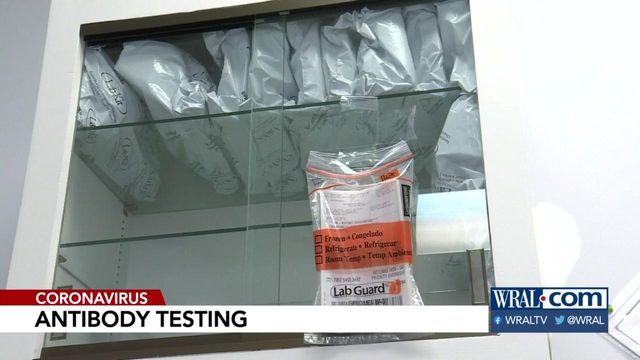NC legislature will fund COVID-19 antibody tests
After calling for weeks for random testing, N.C. Senate leader says 1,000 antibody tests will be mailed to people.
Posted — UpdatedSenate President Pro Tem Phil Berger has been calling for weeks for random sample testing to better gauge the extent of the outbreak, and now the legislature will put up $100,000 itself to mount a project with similar goals, sending people tests through the mail.
Drs. John Sanders and David Herrington will lead the study at Wake Forest Baptist, in collaboration with doctors Michael Runyon and Michael Gibbs at Atrium Health. Dr. John Ioannidis, a Stanford University scientist frequently quoted on the need for random COVID-19 testing, is also a collaborator.
Tests patients receive by mail will be part of a much larger research effort. Although researchers say the sampling won't be truly random, they're relying on demographic data to insure they're getting a representative sample of the state's population.
The test kits will come from Scanwell Health, a Los Angeles-based digital health company. The test is not yet FDA-approved but is permitted for research studies, Berger spokesman Pat Ryan said. The data from the study will be combined with "near-real-time syndromic surveillance" through a platform developed by Oracle and meant to help identify virus hot-spots.
Ryan said the legislature's $100,000 contribution will act as "seed money" to purchase the initial round of 1,000 kits and kickstart the study. He said legislative leaders haven't ruled out allocating future money for the effort, but researchers have applied for federal grants to continue to fund the study and potentially expand it to other states.
Berger's office said some kits went into the mail Monday and that early participants were identified through Wake Forest Baptist’s patient platform.
People will use the kits to prick their fingers once a month for a year, and the test is meant to determine whether their blood contains COVID-19 antibodies.
Antibodies signal that the person has had the virus. They may signal immunity, though it's not yet clear whether people who recover from COVID-19 are immune.
"Much like a political opinion poll, researchers will use the proportion of people in the representative sample who have antibodies to extrapolate the prevalence of immunity to the larger population," Berger's office said Monday.
The Senate leader and other proponents of sampling hope the tests will provide a broader understanding of the virus' hospitalization and fatality rates as North Carolina looks toward reopening its economy, or at least parts of it. Berger's office said that, without data, compliance with stay-at-home orders will fall.
If testing shows things are "as bad or worse than projected, then this data will instill confidence in government decisions and increase compliance," Berger's office said. If it shows things are better, "then we can have confidence that unwinding the economic shutdown can be done safely," his office said.
Lapses in testing supplies have made random trials more difficult. The most common tests involve sticking a swab deep up someone's nose, and the person administering it needs personal protective equipment, or PPE, to avoid potential contamination as the test subject coughs or gags.
This PPE is in short supply, as are some testing reagents, and Gov. Roy Cooper's administration has said repeatedly it doesn't have the supplies needed to prioritize a random sample test.
Berger's office said data from the tests should help state legislators, slated to come into session April 28, make decisions in the coming weeks. Funding for it comes from a legislative discretionary fund.
Berger, R-Rockingham, said in a statement that the study will "fill a critical data gap ... and will help us learn if the true situation is better or worse than the models project."
"Nobody knows the true hospitalization and fatality rates for this virus, even as the government has ordered a full-scale economic shutdown," he said in his statement.
House Speaker Tim Moore also put out a statement, saying the project "will provide state leaders more critical information we need to move forward reopening our economy."
Sanders, one of the Wake Forest Baptist doctors, also provided a statement, through Berger's office
"Coupled with state-of-the-art syndromic surveillance and in collaboration with leading health care providers and companies, our work will help fill a data gap that has existed since the start of the pandemic," he said. "I’m grateful to the North Carolina legislature for providing us with up-front funding so we can begin this critical project."
• Credits
Copyright 2024 by Capitol Broadcasting Company. All rights reserved. This material may not be published, broadcast, rewritten or redistributed.





